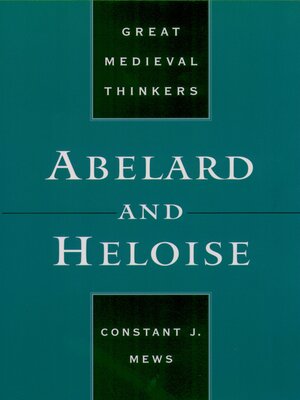
Sign up to save your library
With an OverDrive account, you can save your favorite libraries for at-a-glance information about availability. Find out more about OverDrive accounts.
Find this title in Libby, the library reading app by OverDrive.



Search for a digital library with this title
Title found at these libraries:
| Library Name | Distance |
|---|---|
| Loading... |
Constant J. Mews offers an intellectual biography of two of the best known personalities of the twelfth century. Peter Abelard was a controversial logician at the cathedral school of Notre-Dame in Paris when he first met Heloise, who was the brilliant and outspoken niece of a cathedral canon and who was then engaged in the study of philosophy. After an intense love affair and the birth of a child, they married in secret in a bid to placate her uncle. Nonetheless the vengeful canon Fulbert had Abelard castrated, following which he became a monk at St. Denis, while Heloise became a nun at Argenteuil. Mews, a recognized authority on Abelard's writings, traces his evolution as a thinker from his earliest work on dialectic (paying particular attention to his debt to Roscelin of Compiègne and William of Champeaux) to his most mature reflections on theology and ethics. Abelard's interest in the doctrine of universals was one part of his broader philosophical interest in language, theology, and ethics, says Mews. He argues that Heloise played a significant role in broadening Abelard's intellectual interests during the period 1115-17, as reflected in a passionate correspondence in which the pair articulated and debated the nature of their love. Mews believes that the sudden end of this early relationship provoked Abelard to return to writing about language with new depth, and to begin applying these concerns to theology. Only after Abelard and Heloise resumed close epistolary contact in the early 1130s, however, did Abelard start to develop his thinking about sin and redemption—in ways that respond closely to the concerns of Heloise. Mews emphasizes both continuity and development in what these two very original thinkers had to say.







